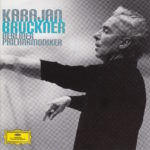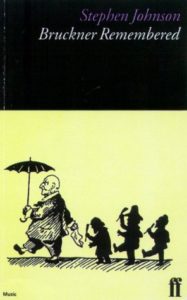 This morning’s conductor of Anton Bruckner’s Symphony No. 1 in C Minor (WAB 101) is Austrian Herbert von Karajan (1908-1989), one of the most highly respected conductors – and interpreters of Anton Bruckner’s music – who ever lived.
This morning’s conductor of Anton Bruckner’s Symphony No. 1 in C Minor (WAB 101) is Austrian Herbert von Karajan (1908-1989), one of the most highly respected conductors – and interpreters of Anton Bruckner’s music – who ever lived.
According to his entry on Wikipedia,
[Karajan] was principal conductor of the Berlin Philharmonic for 35 years. He is generally regarded as one of the greatest conductors of the 20th century, and he was a dominant figure in European classical music from the mid-1950s until his death. Part of the reason for this was the large number of recordings he made and their prominence during his lifetime. By one estimate he was the top-selling classical music recording artist of all time, having sold an estimated 200 million records.
 I’d be lying if I said I wasn’t looking forward to hearing Karajan’s interpretation of Bruckner’s Symphony No. 1 in C Minor.
I’d be lying if I said I wasn’t looking forward to hearing Karajan’s interpretation of Bruckner’s Symphony No. 1 in C Minor.
For as long as I’ve been listening to Classical music (a couple of decades now), the name Karajan has been spoken in nearly hushed tones, as if to merely utter his name aloud would somehow dispel the magic. Or, perhaps, the hush was out of reverence. Either way, Herbert von Karajan’s recordings of Bruckner’s music are regarding as the Cadillac of interpretation.
So, what do I think of them?
First, the objective aspects:
Karajan chose the 1866 Linz version. This performance was recorded in 1981 and released on the revered Deutsche Grammophon label. The orchestra is the Berlin Philharmonic.
That means Bruckner was 41 when he composed Symphony No. 1 in C Minor, and Karajan was 73 when he conducted the orchestra that played it.
Bruckner wrote his symphonies in four parts. The breakdown of this one (Linz version), from this particular conductor (Karajan) and this particular orchestra (Berliner Philharmoniker), is as follows:
Allegro…………..12:53
Adagio……………14:17
Scherzo……………8:54
Finale……………..14:27
By way of contrast, the breakdown of yesterday’s (also using the Linz version), from a different conductor (Jochum) and a different orchestra (Staatskapelle Dresden), was:
Allegro…………..12:29
Adagio……………12:38
Scherzo……………9:02
Finale……………..12:57
Okay. After doing a bit of ciphering, I determined that Karajan stretched out Bruckner’s Symphony No. 1 in C Minor by nearly three and a half minutes, most notably in the Adagio and Finale movements.
Three and a half minutes may seem minor in the overall scheme of things. But where did that time come from? What was Karajan doing?
It appears he was retarding the tempo. Or holding notes longer for emotional impact.
The booklet of liner notes is very well done. It includes a fine essay titled “Karajan and the Bruckner Symphonies” – if, by “fine essay” you’re ready for page after page extolling the virtues of Herbert von Karajan:
The music of Bruckner, like that of Sibelius, was loyally served by Herbert von Karajan over more than four decades. This included a time in the 1930s and 1940s when apathy and factionalism among both public and critics made these the least fashionable of the great symphonists. Such dedication took insight and courage, but by being true to composers like Bruckner and Sibelius, Karajan was being true to his own innermost musical promptings. Certainly, there have been few conductors this century better equipped by background, musicianship, and temperamental predisposition to cope, not only with Bruckner’s orchestral style but also, and more importantly, with his far-flung musical forms and the areas of space, time, and spiritual distance they embrace.
Karajan’s patient, lofty way with mature Bruckner…
Karajan’s Bruckner is a man who contemplates great issues, deeply pondered, and rigorously argued…
One of Karajan’s most telling qualities as a Bruckner interpreter is his matchless control of the long-term rhythm…
I find it interesting that so much of these liner notes seem to be about the greatness of Karajan, rather than the talents of Bruckner.
 The word “spiritual” has again arisen regarding Bruckner. So I went back to one of my four Bruckner books – this one titled Bruckner Remembered by Stephen Johnson – and discovered this starting on page 172:
The word “spiritual” has again arisen regarding Bruckner. So I went back to one of my four Bruckner books – this one titled Bruckner Remembered by Stephen Johnson – and discovered this starting on page 172:
Religion was a primary force in the life of this great creative genius, He prayed regularly, and if his devotions sometimes took strange forms, they were still sincerely offered and deeply felt. It was impossible to disturb him when he knelt at prayer before his great crucifix, and so I often had the opportunity to hear what he said as I stood quietly with him in the room. There were be several “Our Father”s and “Hail Mary”s, and he would often conclude with a free prayer, for example: “Dear God, let me soon be well enough again; you see, I need my health so that I can finish the Ninth,” and so on. (Account written by Bruckner’s physician Richard Heller.)
So…
All of this brings me to my conclusion today.
What do I think of Herbert von Karajan’s interpretation of Anton Bruckner’s Symphony No. 1 in C Minor?
My Rating:
Recording quality: 4
Overall musicianship: 4
CD liner notes: 4 (lots about Karajan)
How does this make me feel: 3
This is a fine interpretation of Bruckner’s First Symphony. No doubt about it.
However, despite the bombast of, say, Allegro and Finale, I wasn’t feeling the Karajan magic – especially on the one piece of music by which I gauge the “Wow Factor”: The last :60 of Adagio (Movement II). The Karajan version leaves me colder than a mountaintop in Alaska. No awe. No sense of wonder. No me hanging on every note to the last, quiet one.
In short, Karajan’s is a strong, solid performance.
But I’ve heard better so far – yesterday’s Jochum, for example. Or Bernard Haitink‘s. Or Gerd Schaller‘s. Or Daniel Barenboim‘s.
Gee whiz. Now that I look at it, I’ve enjoyed every other conductor who used the Linz version more than I did Karajan.
Interesting. I wonder if the hype and braggadocio of Karajan’s liner notes essay – and the drumbeat of “Karajan is the best” raised among Classical music aficionados – have created a bit of a backlash in my soul against Karajan?
No way to know. I really, really wanted to be blown away by this. So it’s probably not the latter.
It’s likely that indescribable, ineffable, mystical, magical something that elevates one performance over another in the ears and souls of the listener.
I just wasn’t feeling Karajan.
At least not this morning.
At least not with Symphony No. 1 in C Minor.
